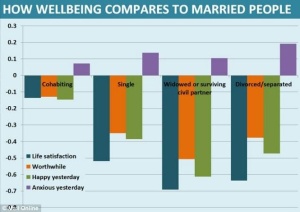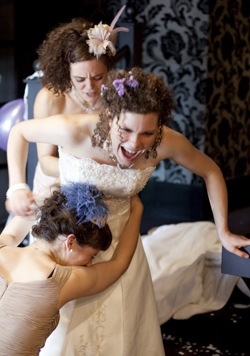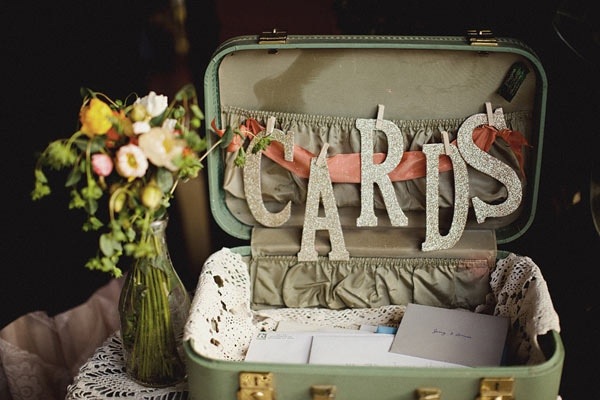So I am wondering if my intense desire to be married is to:
• make me happier? or
• to be happy?
Is there a difference or is it all semantics?
Would I be happy if I was married?
Would I be happier if I was married?
Google being the font of all knowledge,
tells me that the Office of National Statistics
(ONS) completed a survey on Happiness last year. Between April 2011 and March 2012. 165,000 people were asked to rate their life in four areas:
• Overall, how satisfied are you with your life nowadays?
• Overall, to what extent do you feel the things you do in your life are worthwhile?
• Overall, how happy did you feel yesterday?
• Overall, how anxious did you feel yesterday?
On a scale of 0 to 10, where 0 is ‘not
at all’ and 10 is ‘completely’.
The following taken from the report
How is relationship status related to personal well-being?
This section focuses on how our closest relationships, those with spouses and partners relate to personal well-being. This analysis uses the data available in the APS to take a basic look at how relationship status in the household relate to personal well-being.
3.4.1 Key Points
Holding other factors equal:
People who are married or in a civil partnership gave higher ratings for ‘life satisfaction’, feelings that the things they do in their lives are ‘worthwhile’, and ’happiness yesterday’ than those in the other relationship categories.
• People who are widowed, divorced, or separated gave lower ratings for ‘life satisfaction’, feelings that the things they do in their lives are ‘worthwhile’, and ’happiness yesterday’ than other groups.
• People who are married or in civil partnerships rate their level of ’anxiety yesterday’ lower than
other groups.
3.4.2 Delving deeply into our relationships
The analysis looked at current relationship status and considered whether being married, cohabiting, divorced, separated, single or widowed is related to personal well-being when other factors are held equal.
Holding other factors equal:
those who are single, widowed, divorced or separated all have lower average ratings for ‘life satisfaction’, ‘worthwhile’ and ‘happy yesterday’ than people who are married or in a civil partnership.
Looking at the scale of the differences in personal well-being associated with these different relationship situations, other things being equal:
Single people rate their ‘life satisfaction’ 0.5 points lower on average than married people or those in a civil partnership.
The ‘life satisfaction’ scores of people who are widowed and living alone is on average 0.7 points lower than that of married people or those in a civil partnership.
People who are divorced or separated and living alone similarly rate their ‘life satisfaction’ 0.6 points lower on average than married people or those in civil partnerships.
The size of the association between relationship status and personal well-being would be considered moderate.
Although people who are cohabiting also give lower ratings on average than married people/civil partners for ‘life satisfaction’, ‘worthwhile’ and ’happy yesterday’, the scale of the difference between their ratings and those of people in a marriage/civil partnership is much smaller than the difference between married people/civil partners and those in all the other relationship status categories.
In terms of anxiety, all the relationship groups considered here report higher ‘anxiety yesterday’ than married people and those in civil partnerships, but size effects were small (on average, around 0.1 to 0.2 points).
These results are consistent with findings from other studies and confirm that relationships are a key ingredient of personal well-being (Dolan et al., 2008). However, it is important to note that factors that are not measured here may also contribute to a person’s relationship status. For example, if people who tend to be happier are also more likely to get married or to enter into a civil partnership,then the differences in personal well-being observed between those who are married or in civil partnership and those who are not may actually be a reflection of underlying personality differences rather than relationship status per se.

Source: Annual Population Survey – Office for National Statistics
Therefore one could assume that married people are:
~ 0.1 points happier than co-habiting couples
~ 0.3 points happier than single people
~ 0.4 points happier than divorced/separated people
~ 0.6 points happier than those who are widowed or surviving civil partner
But what I would like to know is:
What is 0.4 point of happiness?
What was the actual baseline level of happiness on that same scale for each category?
For instance was the average 7 or 2?
There is presumably is a big difference.
How do you measure happiness anyway?
So
food for thought…
maybe I should concentrate on being happy instead…?
51.541099
-0.003609


